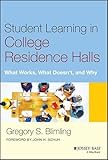Student learning in college residence halls : what works, what doesn't, and why / Gregory S. Blimling.
Material type: TextSeries: Jossey-Bass higher and adult education seriesPublisher: San Francisco, CA : Jossey-Bass, A Wiley Brand [2015]Description: 1 online resource (xxiv, 388 pages)Content type:
TextSeries: Jossey-Bass higher and adult education seriesPublisher: San Francisco, CA : Jossey-Bass, A Wiley Brand [2015]Description: 1 online resource (xxiv, 388 pages)Content type: - text
- computer
- online resource
- 9781118992401 (epub)
- 1118992407 (epub)
- 9781118992395 (pdf)
- 1118992393 (pdf)
- 9781119210795
- 1119210798
- 378.1/9871 23
- LB3227 .B54 2015
- EDU038000
"Add value to the student experience with purposeful residential programsGrounded in current research and practical experience, Student Learning in College Residence Halls: What Works, What Doesn't, and Why shows how to structure the peer environment in residence halls to advance student learning. Focusing on the application of student learning principles, the book examines how neurobiological and psychosocial development influences how students learn in residence halls. The book is filled with examples, useful strategies, practical advice, and best practices for building community and shaping residential environments that produce measureable learning outcomes. Readers will find models for a curriculum-based approach to programming and for developing student staff competencies, as well as an analysis of what types of residential experiences influence student learning. An examination of how to assess student learning in residence halls and of the challenges residence halls face provide readers with insight into how to strategically plan for the future of residence halls as learning centers.The lack of recent literature on student learning in college residence halls belies the changes that have taken place. More traditional-age students are enrolled in college than ever before, and universities are building more residence halls to meet the increased demand for student housing. This book addresses these developments, reviews contemporary research, and provides up-to-date advice for creating residence hall environments that achieve educationally purposeful outcomes. Discover which educational benefits are associated with living in residence halls Learn how residential environments influence student behavior Create residence hall environments that produce measureable learning outcomes Monitor effectiveness with a process of systematic assessment Residence halls are an integral part of the college experience; with the right programs in place they can become dynamic centers of student learning. Student Learning in College Residence Halls is a comprehensive resource for residence hall professionals and others interested in improving students' learning experience"-- Provided by publisher.
Includes bibliographical references (pages 307-351) and index.
Machine generated contents note: Table of Contents List of Tables and Figures Foreword Preface Acknowledgments Chapter 1. The Historical and Philosophical Foundations of Student Learning in Residence Halls Chapter 2. How Biological and Psychological Development Influence Student Learning and Behavior Chapter 3. How Students Learn in Residence Halls Chapter 4. How to Create Learning Environments in Residence Halls Chapter 5. Selecting and Developing Residence Life Staff to Advance Student Learning Chapter 6. How Residential Environments Influence Student Learning Chapter 7. How to Create Community in Residence Halls to Enhance Student Learning Chapter 8. Managing Student Life in Residence Halls to Support Student Learning Chapter 9. Assessing and Improving Residence Life Programs to Advance Student Learning Chapter 10. The Future of Residence Halls References Index .
Description based on print version record and CIP data provided by publisher.
The historical and philosophical foundations of student learning in residence halls -- How biological and psychological development influence student learning and behavior -- How students learn in residence halls -- How to create learning environments in residence halls -- Selecting and developing residence life staff to advance student learning -- How residential environments influence student learning -- How to shape the peer environment in residence halls to advance student learning -- Managing student life in residence halls to support student learning -- Assessing and improving residence life programs -- The future of residence halls.
